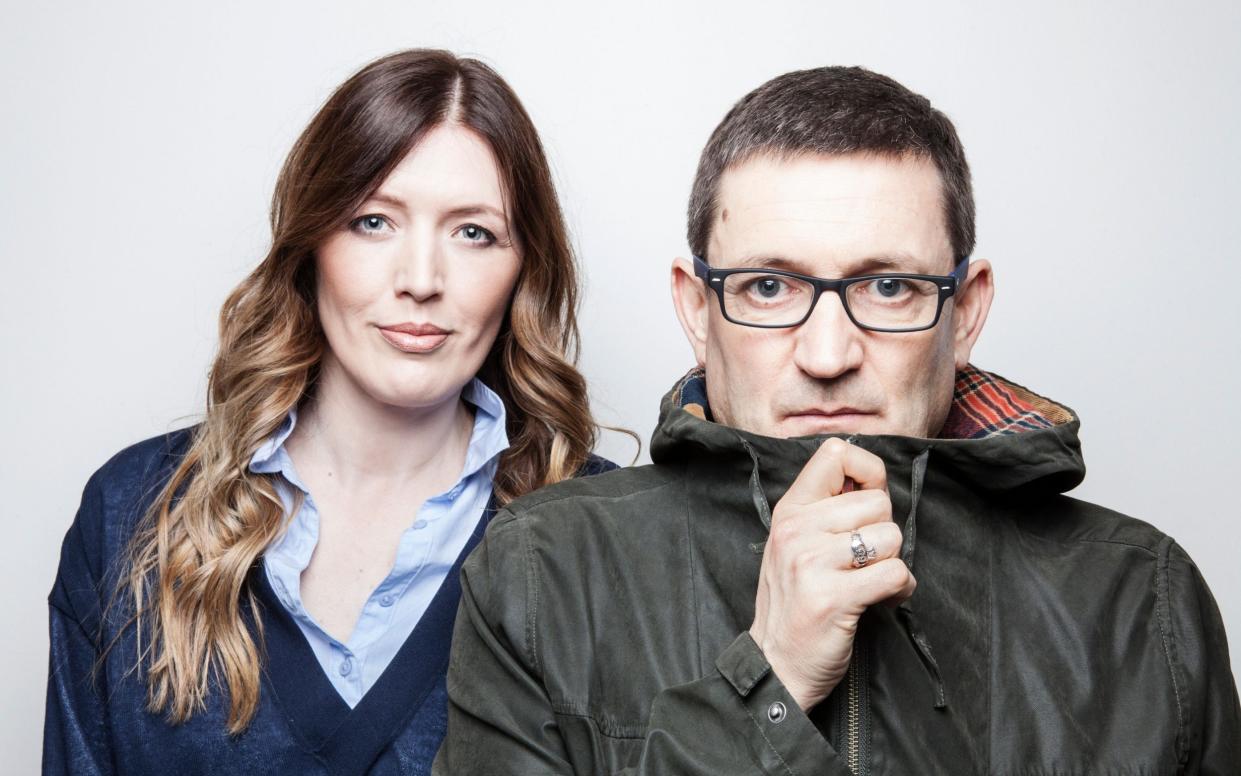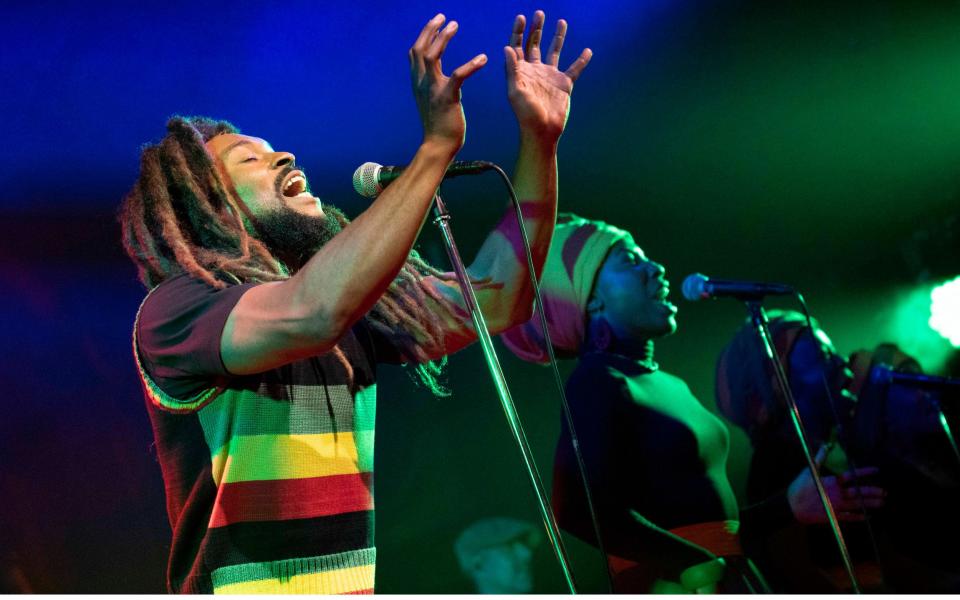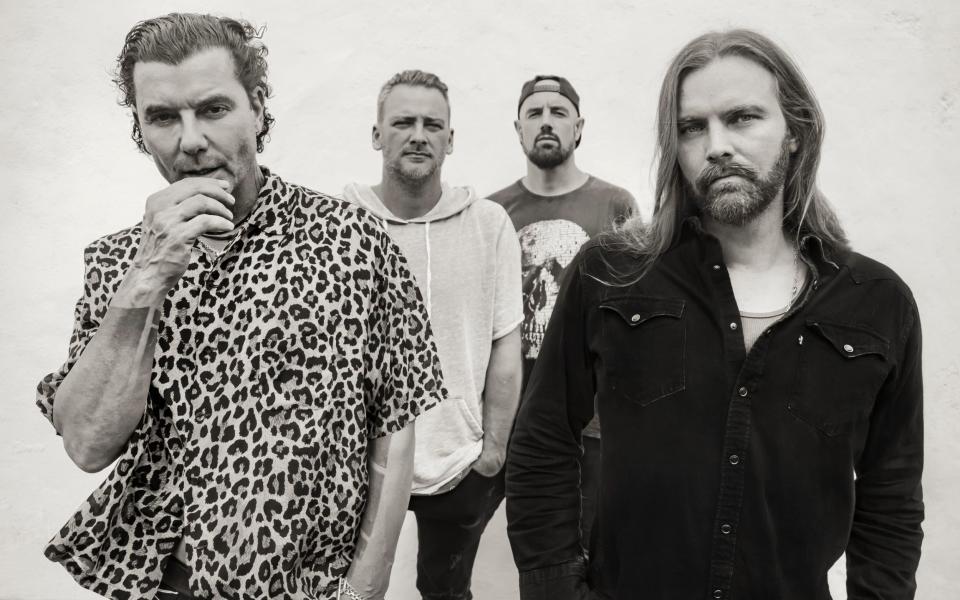Paul Heaton lacks imagination, The Cult have flashes of greatness – the week’s best albums

- Oops!Something went wrong.Please try again later.
- Oops!Something went wrong.Please try again later.
Paul Heaton & Jacqui Abbott, N.K-Pop ★★★☆☆
Paul Heaton is back, doing that thing he does, threading barbed wired lyrics through rose garden melodies to catch listeners unawares. N.K-Pop is his fifth album as a duo with former Beautiful South vocalist Jacqui Abbott. The album title is a typical Heaton joke, a sly crack at the overproduced super-slick youth-centric flashiness of fashionable K-pop, emanating from South Korea. Heaton’s humorously grouchy conceit is to ally himself with its exact opposite. “Lyrically, we’re all about North Korea,” he has joked. “We’re K-pop if you’re on the wrong side of the border.”
This is not so much a reflection of his lifelong socialism as a kind of contrarian instinct to come at things from unexpected directions, take an opposite point of view, and surprise listeners with acerbically direct truth-telling. You are unlikely to have heard a less sentimental song about the death of a parent than belting garage rocker His Mother’s Womb, on which he speculates on whether his late mother is giving the devil a ticking off or making heaven hellish for the angels. Nevertheless, such sarcastic wit lends the song real emotional pungency on its rollicking, declamatory chorus: “So take my passport in your hand / But never you presume / Cos I’m not British, I’m not English / I’m from my mother’s womb.”
Musically, too, the phrase N.K-Pop has a ring of truth. Heaton is stoically old fashioned, the kind of pop craftsman who wants the words and music to do all the heavy-lifting, forgoing stylistic and technological advances to bash his songs out with live musicians in retro styles of ska, country, soul and pre-1967 beat music. Effectively it is pub rock, and indeed liner notes reveal that the songs were all written in assorted drinking hostelries. Opening track, The Good Times, is even set in a pub, its jaunty tempo and ringing melody gradually being turned inside out by the realisation that the landlord narrator is stewing in memories of times that will never be good again, riven by guilt for the death of his wife. “I lit the first cigarette / That caused the addiction / That gave her the cancer / That took her from me.”
Over 37 years as the driving force behind two much loved bands, The Housemartins and The Beautiful South, as well as solo and as a duo with Abbott, Heaton has notched up 15 million album sales with this very particular brand of acerbic easy listening. Earlier this year, the 60-year-old Liverpudlian was presented with a deserved Ivor Novello Award for Oustanding Song Collection. He is a special talent, and it doesn’t hurt that he has a reputation as one of pop’s good guys, celebrating his landmark birthday by putting £1,000 behind the bars of 60 pubs around Britain and Ireland for fans to have a drink on him.
Abbott is very much the junior partner in their double act. Heaton himself has a beautiful plangent voice, to which Abbott’s lovely tone and timbre is perfectly matched, so that she effectively sounds like a female version of the frontman. They harmonise delightfully, and occasionally Abbott takes the lead, or provides a second character for split narrator interactions. This approach shines on Baby It’s Cold Inside, a punchy zinger about sexual harassment, but proves confusing on Too Much for One (Not Enough for Two), a song written from a singular perspective then artificially divided in two.
Heaton is no fan of The Daily Telegraph, and, indeed, on the cheerfully trite Sunny Side Up has Abbott advocating burning this venerable newspaper (along with the Mail, Express and Sun) for a more peaceful life. So I don’t expect him to take my criticisms to heart. But as with so many of his albums, I find myself wishing he would push himself a little harder. There are a handful of stunning songs on here. His Master’s Voice is a sinister political masterpiece about Machiavellian fixers, given a suitably ominous arrangement, whilst the heart rending Still should come with trigger warnings for any parent who has suffered from a stillbirth. We should treasure any songwriter prepared to tackle difficult subjects with intelligence and heart.
But there are a few too many songs on N.K-Pop that are just witticisms, wordplay and easy on the ear melodies, bashed down in the studio with a certain vigour but no real imagination. Like a joke that is all about the punchline, there can be little to draw a casual listener back in once you’ve heard it. N.K-Pop will be a treat for Heaton’s fans. But it could probably use a little K-pop power if he harbours any desire to reach and preach to the unconverted. Neil McCormick
The Cult, Under the Midnight Sun ★★★☆☆
In the first week of June 1986, propelled by the success of the previous year’s Love album and its mega-singles Rain and She Sells Sanctuary, The Cult appeared at the Provinssirock Festival in Finland. As the hour grew late, singer Ian Astbury had a revelatory moment as the sun went down. Or rather, being Finland in summer, when it didn’t.
“It’s three in the morning, the sun’s up, and there’s all these beautiful people in this halcyon moment,” he recalled earlier this year. “People are laying on the grass, making out, drinking, smoking. It was an incredible moment. When the world stopped [for the pandemic], I had this moment to write in real time, to calculate. I was compelled by this vision, this anomaly, this memory, of being under the midnight sun.”
Hence the title of The Cult’s 11th album, Under the Midnight Sun. With similar nostalgia, Astbury and guitarist Billy Duffy returned to Wales’ Rockfield Studio for the first time since recording their Dreamtime debut there in 1984. Somewhat ironically, given their apparent attempt to reconnect with something from their youth, the album is actually rather dark and brooding, hewn with the weary wisdom of men older than they were.
Then again, this is perhaps to be expected, given the times in which it was written. There’s a sense of doom, of being untethered, of isolation to it all, albeit with the band’s usual grandiose wall of sound. Opener Mirror is a dusky, gothic sweep topped with Astbury’s classic, smoky wail, while A Cut Inside features a classic Billy Duffy lead guitar motif that still manages to maintain its shadowy demeanour. On the pulsing, electronic slither of Vendetta X, on which Astbury speaks menacingly of “sucking on a dirty blade”, it’s closer to his work with Unkle than stadium rock.
In these moments, and on the glorious, closing title-track, Under The Midnight Sun is brilliant. For much of its second half, however, its magic doesn’t catch quite so well. But four decades, multiple splits and countless line-up changes in for The Cult, such flashes of greatness are still to be prized. Nick Ruskell

The Snuts, Burn the Empire ★★★★☆
To announce Burn the Empire, The Snuts did something delightfully cocky. At the end of 2021, still high on having beaten Demi Lovato to number one a few months earlier with their debut, W.L, the West Lothian quartet went on a long, victory-lap tour of the UK. Rather than an encore of their traditional hit Sing For Your Supper at the London stop, they instead banged out an unreleased new song, the title track to this second album. Barely six months since striking gold with their first step they were already saying: “Yeah, but wait until you see what’s next.”
More lively than W.L., Burn the Empire is also sharper, slicker and more strutting – the comparisons to a young Arctic Monkeys won’t be going anywhere any time soon. On the opening title track and social media-bating Zuckerpunch (featuring samples from the Late Tony Benn and the U.S. Senate respectively), they play with a sassy sneer. But then they turn on the charm.
Pigeons In New York cruises in on a Dylan-ish strum, before exploding joyously with fuzz. The Rodeo pulses with a dancey bassline, while the groovy Hallelujah Moment sees singer Jack Cochrane delivering his quick-fire vocals with the smoothness of a greased-up Roger Moore. On Cosmic Electronica, meanwhile, he declares that, “I’m looking at earth like a jigsaw, wanna f—k it all up with a nail bomb” and that “I’ve got a peashooter filled with titanium” through a warped effect. If he’s going to be compared to Alex Turner, at least the comparison is earned. And he sounds like he knows it.
And that’s the thing. The Snuts know how good they are, and they’ve got the abusive tweets from aggrieved Demi Lovato stans to prove it. Britain’s next truly great guitar band? They seem to think so. Nick Ruskell
Charlie Puth, Charlie ★★★★☆
With eight multi-platinum singles, four Grammy nominations, over 10 billion streams and writing credits for everyone from Justin Bieber to Katy Perry, Charlie Puth is undoubtedly one of the finest hitmakers of his generation. A classically trained pianist, Puth rose to fame as a YouTuber before signing with Atlantic Records in 2015, with two astronomically successful singles – including the Fast and Furious soundtrack – following soon after.
Despite this, his first two albums received mixed receptions, which is perhaps why Puth’s third, Charlie, feels so much like a statement of intent. Out today and entirely self-produced, the 30-year-old calls it “my most personal body of work”. “I’ve been doing this for eight years, but Charlie is finally me,” has said Puth. “For a long time, I was trying to be ‘the cool guy’.”
Where songs like 2019’s risqué Mother felt inauthentic, 12-track Charlie is reflective of the humorous, dorky persona Puth’s 20 million TikTok followers have come to adore. It’s a heartbreak record that sees Puth process the end of a relationship, a classic self-realisation story that ends with the cathartic final track No More Drama, where, in his trademark high register, he sings: “I’ve finally realised I’m better off without you”.
While some of the songs slip into genericity, such as the forgettable There’s a First Time For Everything, others are 80s-inspired, synth-led earworms. Smells Like Me stands out as one of the album’s highlights, a masterclass in pop writing with an ultra-memorable hook. The opener That’s Hilarious serves an early reminder of just how good Puth is at writing ridiculously catchy hooks; how simple-but-effective his melodies are.
Charlie Be Quiet brings the same comedy that has made Puth so endearing to his fans, giving himself a pep talk about coming on too strong: “You got to lower the noise a little bit now/ If she knows you're in love, she's gonna run away”. Throughout, his production is knowingly playful, too, from the light switch sound in Light Switch to the music panning from left to right speaker in Left and Right (Ft. Jung Kook of BTS).
There’s something not quite distinct enough about his sound, however. Sure, this is expertly-crafted pop, but it doesn’t mark Puth out from the other greats in his peer group, be that Shawn Mendes, Ed Sheeran or The Weeknd. That in itself is a shame, considering how unusual Puth’s production and songwriting prowess make him in the music industry’s top tier. In terms of talent, he more than stands out from the crowd. But the songs themselves don’t always do the same. Kathleen Johnston
Flohio, Out of Heart ★★★☆☆
For the last four years south London emcee Flohio has been consistently touted as “the next big thing”, praised for an elevated flow that tends to work best over beats that sound like they were concocted to appeal to 4am ravers tweaking on ketamine. The release of her long-awaited debut LP, Out of Heart, is a chance to rubber stamp all this hype and turn co-signs from hipster London-based music bloggers into a bigger mainstream audience.
The marriage of melancholy and twisted nocturnal synths on Grace suggests the 29-year-old has improved as a songwriter, as she powerfully concedes: “My aunt just died from cancer, don’t ask where my smile is / I’m still inside that furnace.” In the past the artist has felt a little distant, seemingly afraid to let people in. Yet here she wisely grounds her celestial rap persona in something more human and relatable.
The production, courtesy of UK duo God Colony, is particularly great on Feel Alive, with the song’s sparkly synths towing the line between sugar trap and a casino-themed level on Sonic the Hedgehog. This beat inspires Flohio to wake up from a grief-driven slumber, as she tellingly pledges: “From the dead I have risen”.
But in a UK rap scene that’s filled with an abundance of vibrant personalities who make you feel like you’re directly invested in their rags-to-riches backstories, it still feels like the artist is holding too much back. Just when you feel like you’ve made a breakthrough and Flohio is ready to truly let you in, she reverts to self-referential metaphors and boasts (“Wait for the fuller me” she pledges on 2 Hours) that don’t seem to say much.
On Higher, Flohio spits: “I nearly lost my life but God held me down.” A braver songwriter would expand on this idea, letting the listener know exactly what this looked like in reality. On Out of Heart, Flohio deserves credit for bridging the worlds of rap and electronica, but you’re still left wondering: who is the human being behind this aesthetic? If she’s to truly level up artistically, Flohio needs to give us a clearer idea of what the reflection in the mirror looks like. Thomas Hobbs
Willow Smith, Coping Mechanism ★★★★☆
“Fun fact, I’m so sick of myself ”, Willow Smith flippantly belts on her album title track, Coping Mechanism. An intro to the thoroughly Gen Z alt-rock star and daughter of Will Smith, the opener – and name of the record – quickly sets the tone for the 21-year-old’s crunchy, high-octane performance.
Trading her bolshy pop-punk stamp for the heavier rhythms of grunge rock, Willow goes solo in guitar-crashing reverie. Following her initial punk statement, 2021's Lately I Feel Everything, Coping Mechanism is a hefty dose of cranked-up generational angst. Dressed up in sledgehammer drums and trashing guitars, Coping Mechanism’s anthems of adolescence fall close to visions of her previous release. Still, she holds little back reckoning with topics of mental health, queerness and personal traumas.
On the short-lived Pressure, Willow laments the yielding strain of expectation (“I don’t wanna talk sh-t but I’m so f---ed up just like this”) through throaty strained screams. Elsewhere, the star’s youthful disaffected lyrics continue to shine through. There’s no doubt her sharp penmanship has taken inspiration from her mother, Jada Pinkett Smith, who immersed her into the world of nu-metal via her LA band Wicked Wisdom. Falling Endlessly and closeout Why showcase Willow’s ability to sling from gentle, raw notes to ear-shattering shouts with ease as she unpicks how it feels to be an untethered, lonely youngster.
A handful of Willow’s most popular tracks have rested on collaborations that haven’t always felt authentic. But, in Coping Mechanism, we see the singer becoming bolder and braver as she departs from mystic R&B and soul roots. In just 11 full-throttle tracks, Coping Mechanism gives us a glimpse at the future of rock. Zoya Raza-Sheikh

Get Up Stand Up! – The Bob Marley Musical ★★★☆☆
From a music point of view, it’s initially hard to see the point of this soundtrack album to Get Up Stand Up! The Bob Marley Musical, which is currently running in London’s West End. After all, Marley’s greatest hits album Legend is in the Captain Corelli’s Mandolin category of “every household owns a copy”, while the reggae superstar’s back catalogue is openly available on streaming platforms. But taken as a stand-alone storytelling device – and as a vessel for musical interpretation rather than imitation, to quote the liner notes – this album becomes an interesting listen.
Refreshingly, some of Marley’s biggest hits are omitted. There is no room for Buffalo Soldier, Stir It Up, I Shot the Sheriff, War or Redemption Song. Rather we get lesser-known tracks such as Trenchtown Rock and Duppy Conqueror, which help trace Marley’s musical journey from simple ska to radio-friendly reggae. The song Roots Rock Reggae from 1976 acts as a kind of manifesto for what music and success mean to him (“Want all my people to see/ We’re bubblin’ on the Top 100”).
It’s heartening, also, to see the inclusion of So Much Things To Say and Turn Your Lights Down Low, two of only five tracks from Marley’s 1977 album Exodus not to be released as singles. The soundtrack version of the latter ballad ramps up its steamy soul leanings and is sung by Arinzé Kene as Marley, Gabrielle Brooks as his wife Rita and Shanay Holmes as his lover Cindy Breakspeare, neatly reflecting Marley’s complicated love life. Waiting In Vain is similarly reworked, its plaintive lines (“don’t treat me like a puppet on a string”) sung by the female characters rather than Marley himself. No Woman No Cry is stripped right back to become an affecting ballad between Bob (this time with Michael Duke singing) and Rita that must be quite a powerful moment on stage. Earlier this year, the show’s orchestrator Simon Hale won an Olivier Award for Get Up Stand Up!’s score, beating Life of Pi, Anything Goes and Back To The Future. It’s deserved.
Marley is too often commoditised and his legacy Disneyfied. This year’s Bob Marley: One Love Experience exhibition at London’s Saatchi Gallery was a lazy, patronising and cynical cash-in. This album is a different kettle of fish. It’s a respectful and considered reinterpretation of a true legend’s work. James Hall

Bush, The Art of Survival ★★★☆☆
Bush frontman Gavin Rossdale has lived a curiously double life. In the 90s, he was a stadium-filling grunge god in the US; his Grammy-nominated British band a near-permanent fixture on radio and movie soundtracks. Yet back home in the UK, Bush were derided as Nirvana wannabes or, worse, ignored, with Rossdale best known for his former marriage to rock’s first lady, Gwen Stefani.
Since reuniting in 2011 nearly a decade after they split, the band have quietly regained some respectability on both sides of the Atlantic as a heavy rock outfit. This ninth album sets the tone within seconds in the brooding bassline, cacophony of drums and heavy guitars of opener Heavy is the Ocean. It’s an obvious reaction to the turmoil of recent years, an atmospheric, desperate treatise on our collective ability to keep calm and carry on.
Rossdale returns to this theme throughout the record with varying degrees of success. At its worse, his observations on the state of the world are plain toe-curling, telling us in Shark Bite, “This earth is a mad house, this planet’s so screwed” with all the thoughtful gravitas of an angry teenage boy.
Yet the lyrical sense of doom largely suits the formidable barrage of guitars and meaty riffs that prove this album is far from a midlife vanity project. Slow Me is an atmospheric stadium filler and one of the catchiest tracks here, Human Sand pairs an other-worldly chorus chant with an unexpectedly bluesy edge, and Kiss Me I’m Dead is a heavy metal Bond theme in the making.
It remains a fairly relentless listen and at least a couple of tracks too long. Yet the album’s tale of survival against the odds has powerful personal relevance beyond its often clumsy social commentary. Of course, it’s still unlikely to convert the non-believers, but you suspect even Bush know that by this stage. Siobhan Grogan
Courtney Marie Andrews, Loose Future ★★★★☆
“I’m not used to feeling good,” Courtney Marie Andrews warns on Change My Mind, towards the end of her new album Loose Future. It’s a fleeting acknowledgement of uncertainty as the acclaimed Phoenix-born singer-songwriter nudges determinedly out of her comfort zone both musically and personally on this record.
After over a decade of incessant touring, the shift was a conscious move by Andrews to reclaim her life and process all that has happened to her so far. Barely into her 30s, she had already released several slow-burning country-indie albums when 2020’s Old Flowers crept to the top of countless Album of the Year lists. Its bruised intimacy revealed the breakdown of a long-term relationship with suffocating sadness and eventually left Andrews ready to make a change.
Her latest album is the deliciously sensuous sound of this new phase; the result of a decision to tweak her outlook and open herself up to the prospect of love, hope and the uncertainty of new relationships. It’s very much a product of its idyllic creation, written and recorded in a beach shack in Cape Cod and a studio in the Catskills Mountains between daily hikes and dips in the creek. The hazy sunshine of those days now seems to seep into the very core of this album. Older Now reveals a steely self-acceptance beneath its lilting loveliness, I’ll Be Thinkin’ On You is a lovestruck country swoon and the blissed-out Satellite swells with unmistakable contentment, Andrews’ exquisite, pure vocals soaring above slide guitars.
It's a gloriously mellow record, the sound of an artist remembering there’s a life beyond her touring schedule and daring to enjoy it. Though this album may not have quite the same unflinching impact of Old Flowers, it sees Andrews’ ever-present vulnerability finally becoming her greatest strength as she inches cautiously towards hard-won happiness. Siobhan Grogan
Sorry, Anywhere But Here ★★★★☆
Sorry wants to take you somewhere, even as they’re stuck roving the same old streets. The band’s second album is at times unified and loud, and at others, mysterious and creeping. Reliant on gritty, cassette-quality vocal effects and ghostly refrains, Sorry is at its best when vocalists Louis O’Bryen and Asha Lorenz are in song or tight conversation.
Each track contains surprises. Opener Let the Lights On nods to prime Arcade Fire: an aughts rock rallying cry around a relationship’s regrettable end. Its follow-up Tell Me kicks off with O’Bryen’s trapped, echoey vocal which suddenly cuts free, while the insistent Key To My City makes a sly, tongue-in-cheek allusion to Cat Stevens' Wild World with its rhyming and lyricism.
The song There’s So Many People That Want To Be Loved contains the album’s thesis: that what we want most can be rendered impossible by our own inaction. Anywhere But Here charts the perils of miscommunication amid love, desire, and loss.
The album’s inability to communicate with itself – each song an island – does bring some drag to the album’s runtime. Nevertheless, elegiac and anthemic, each song has spark. Caitlin Wolper

